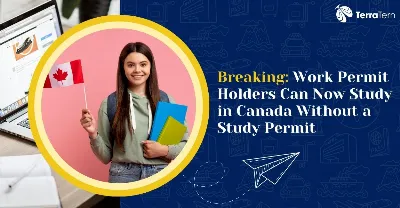Key Highlights
Immigration, Refugees and Citizenship Canada (IRCC) has recently announced that selected work permit holders in Canada will be allowed to pursue their studies without necessarily requiring a separate study permit. This policy becomes effective from December 6, 2024. This now clarifies the guidelines of work permit holders whose permits were applied before June 7, 2023. It is an extension of the temporary measure brought in by the 2023 one that will remain until June 27, 2026.
Am I Eligible to Study in Canada Without a Study Permit?
This exemption is available to work permit holders if they meet at least one of the following conditions:
1. They must have a valid work permit that they applied for before or on June 7, 2023 (IRCC must have received the application by this date).
2. They would have also been able to renew their work permit before June 7, 2023 and get a work authorisation from IRCC upon processing the renewal.
3. The new comers who applied for their work permits after June 7, 2023 do not qualify under this policy.
4. Work authorizations are letters issued by IRCC to some newcomers while processing their applications, enabling them to work in Canada pending a decision.
5. Applicants can go on and work before their existing work permit expires, or can submit an application for an extension stay and a co-op work permit.
6. Plus, any foreign student in Canada who's holding a valid study permit besides holding the valid co-op work permit, can consider further schooling if the listed conditions shall be met.
-
Compliance with the conditions of their current study permit.
-
Continuation of studies in their main program.
-
The length of the additional study program does not exceed that of their current co-op work permit.
Also Read: Canada Visitor Visa To Work Permit: Convert Your Visa in 2024
How Long Can Work Permit Holders Study Without a Study Permit?
Eligible individuals can study in Canada without a study permit until one of the following occurs:
-
Their current work permit expires.
-
Their application for renewing the work permit expires or is refused.
-
The temporary policy expires on June 27, 2026.
How Can I Show My School that I am Study Permit-Exempt When Applying?
To demonstrate eligibility for the study permit exemption to a Designated Learning Institution (DLI), work permit holders or applicants can present one of the following documents:
-
Their current valid work permit.
-
The Acknowledgment of Receipt (AOR) received after applying for a work permit extension (for online applicants).
-
The work authorization letter received after applying for a work permit exemption.
-
An email from IRCC confirming qualification under the public policy allowing some work permit holders to be exempt from needing a study permit.
The Benefits of Continuing Education in Canada
Pursuing education in Canada offers numerous economic and immigration advantages, such as:
1. Research by Statistics Canada indicates that newcomers with Canadian educational experience prior to obtaining permanent residence tend to perform better in the labour market compared to those without such experience.
2. In the first one to two years post-permanent residency, graduates from Canadian institutions earn approximately 27% more than those who studied abroad. This trend continues over time; even after ten years, those with Canadian educational backgrounds earn between 9-12% more than their peers lacking such experience.
3. Continuing education also enhances eligibility for permanent residency. Immigration programs related to Express Entry utilize the Comprehensive Ranking System (CRS), which awards points based on human capital factors like education.
4. Higher education levels correspond with increased points and higher chances of receiving invitations to apply for permanent residency.
Read More: Is It Easy To Get PR In Canada in 2024? Here is the Truth
Points Awarded Based on Education Level:
|
Level of Education |
Points with Spouse/Partner (Max 140) |
Points without Spouse/Partner (Max 150) |
|
Less than high school |
0 |
0 |
|
High school diploma |
28 |
30 |
|
One-year post-secondary credential |
84 |
90 |
|
Two-year post-secondary program |
91 |
98 |
|
Bachelor’s degree or three-year program |
112 |
120 |
|
Two or more certificates/diplomas |
119 |
128 |
|
Master’s degree or professional degree |
126 |
135 |
|
Doctoral degree (Ph.D.) |
140 |
150 |
Also Read: New Rules for Canada Immigration: Experts Latest Update
Additional points can be earned for Canadian work experience and proficiency in official languages, further enhancing CRS scores.
Continuing studies can also make individuals eligible for provincial immigration pathways specifically designed for international graduates. Examples include:
|
Provincial Pathway |
|
Employer Job Offer: International Student stream (Ontario) |
|
Master's Graduate stream (Ontario) |
|
PhD Graduate stream (Ontario) |
|
International Graduate stream (British Columbia) |
|
International Post-Graduate stream (British Columbia) |
|
Graduate Entrepreneur stream (Alberta) |
|
International Education stream (Manitoba) |
|
International Graduate Entrepreneur stream (Nova Scotia) |
|
International Graduates in Demand stream (Nova Scotia) |
|
New Brunswick Student Connection (New Brunswick) |
If you are considering studying in Canada or need assistance navigating immigration options, TerraTern is here to help you explore your possibilities and ensure you make informed decisions about your future. Contact us today!






